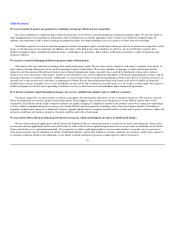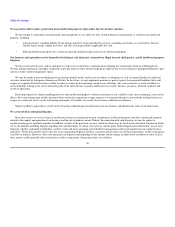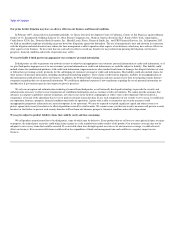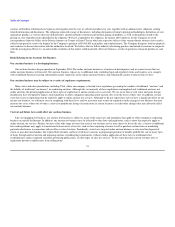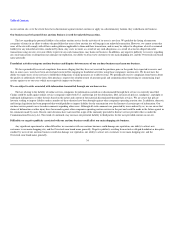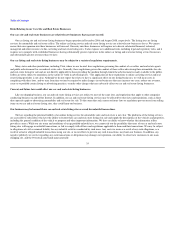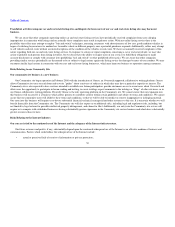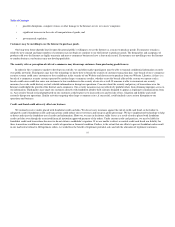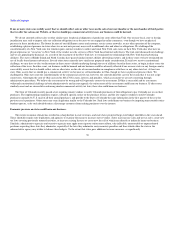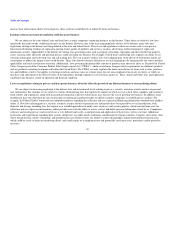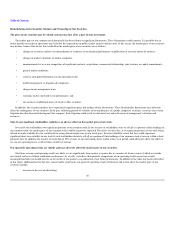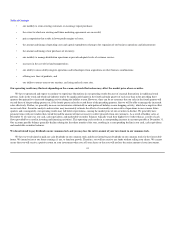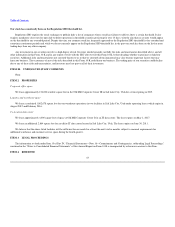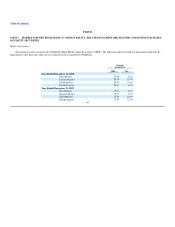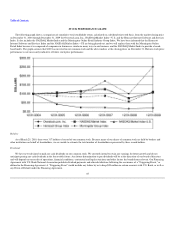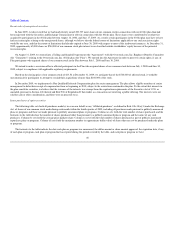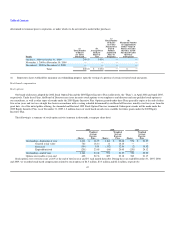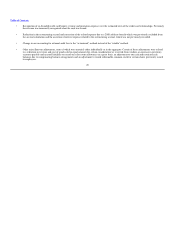Overstock.com 2009 Annual Report Download - page 42
Download and view the complete annual report
Please find page 42 of the 2009 Overstock.com annual report below. You can navigate through the pages in the report by either clicking on the pages listed below, or by using the keyword search tool below to find specific information within the annual report.
Table of Contents
increase their enforcement efforts of existing laws, these activities could directly or indirectly harm our business.
Existing or future government regulation could harm our business.
We are subject to the same federal, state and local laws as other companies conducting business on the Internet. Today there are relatively few laws
specifically directed towards conducting business on the Internet. However, due to the increasing popularity and use of the Internet, many laws and
regulations relating to the Internet are being debated at the state and federal levels. These laws and regulations could cover issues such as user privacy,
behavioral advertizing, freedom of expression, pricing, fraud, quality of products and services, taxation, advertising, intellectual property rights and
information security. Applicability to the Internet of existing laws governing issues such as property ownership, copyrights and other intellectual property
issues, taxation, libel, obscenity and personal privacy could also harm our business. For example, United States and foreign laws regulate our ability to use
customer information and to develop, buy and sell mailing lists. The vast majority of these laws were adopted prior to the advent of the Internet and do not
contemplate or address the unique issues raised thereby. Those laws that do reference the Internet are only beginning to be interpreted by the courts and their
applicability and reach are therefore uncertain. Additionally, laws governing the permissible contents of products may adversely affect us. Recently the United
States Congress passed the Consumer Product Safety Improvement Act ("CPSIA"), which created more stringent safety requirements for children's products
and any products containing lead paint sold within the United States. The CPSIA, not only regulates the future manufacture of items such as cribs, pacifiers,
toys and children's jewelry, but applies to existing inventories and may cause us to incur losses for any non-compliant items in our inventory, or which we
may have sold subsequent to the effective dates of the legislation, through regulatory or civil actions against us. These current and future laws and regulations
could harm our business, results of operation and financial condition.
Laws or regulations relating to privacy and data protection may adversely affect the growth of our Internet business or our marketing efforts.
We are subject to increasing regulation at the federal, state and international levels relating to privacy, security, retention, transfer and use of personal
user information. For example, we are subject to various telemarketing laws that regulate the manner in which we may solicit future suppliers and customers.
Such statutes and regulations, along with increased governmental or private enforcement, may increase the cost of growing our business. In addition, many
jurisdictions have laws that limit the uses of personal user information gathered online or offline or require companies to establish privacy policies. For
example, the Federal Trade Commission has adopted regulations regarding the collection and use of personal identifying information obtained from children
under 13. New laws affecting privacy, security, retention, transfer and use of personal user information have been passed by several jurisdictions, both
domestic and foreign, including laws that require us to establish procedures to notify users of privacy and security policies, obtain consent from users for
collection and use of personal information, and/or provide users with the ability to access, correct and delete personal information stored by us. Compliance
with new and existing privacy and security laws is very difficult and costly, as interpretation and application of these laws evolves over time. Additional
restrictions and requirements regarding data security and privacy are under nearly continuous consideration by foreign countries, Congress and various states.
These data protection statutes, regulations and interpretations may further restrict our ability to collect demographic and personal information from users,
which could be costly or harm our marketing efforts, and could require us to implement new and potentially costly processes, procedures and/or protective
measures.
39


